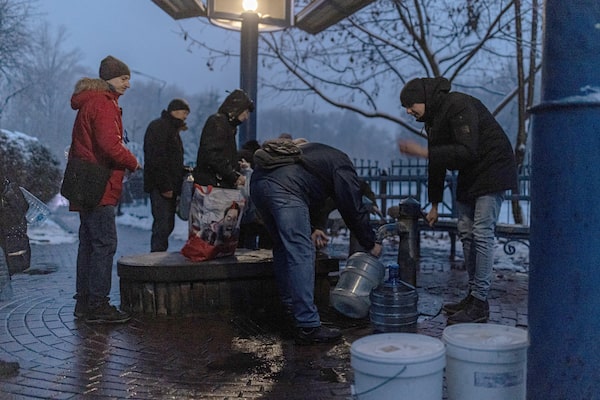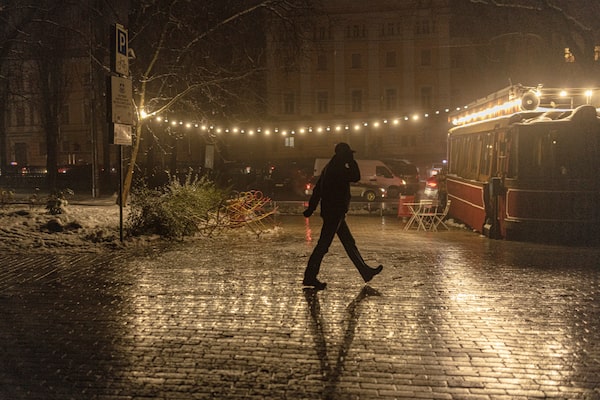
A police officer works traffic control in Kyiv on Nov. 24 as most of the Ukrainian capital remains in a blackout.Photography by Anton Skyba/The Globe and Mail
The waitress smiled apologetically as she discussed the breakfast offerings at Idealist, a popular café in one of Kyiv’s most affluent neighbourhoods. The power was on, so they could make anything that involved a frying pan or an electric kettle.
But there was no WiFi. And no running water, so no toilets.
Several would-be customers sighed and decided to leave, packing up their laptops, after learning of the less-than-ideal conditions for remote working. Others shrugged and decided to stay. A hot breakfast wasn’t easy to come by in a city that was largely without lights or heat, and it was warmer inside the café than on the streets, where freezing rain was hardening a days-old layer of snow.
This is life in Kyiv at the start of the 10th month of Vladimir Putin’s war against Ukraine, the day after Russia struck this country’s civilian infrastructure with yet another barrage of cruise missiles and suicide drones. Electricity, water and gas supplies were disrupted in almost every major city in the country, and all four of Ukraine’s active nuclear power plants were briefly disconnected from the grid on Wednesday.
Despite the bravado emanating from this country’s political and military leaders – and the heroic stoicism of the population – life under Russia’s long-range siege is becoming unquestionably grim.

A flower-shop worker fixes wires to connect a generator in Kyiv.
Wednesday was the first night without heat in The Globe and Mail’s apartment in the centre of Kyiv, other than bursts provided by plug-in electric heaters during the short periods the power was on. Even before the most recent attacks, most of the city was only receiving electricity for 12 hours a day, delivered on a schedule of four hours on, four hours off.
Thursday was the first morning without hot water for showers. But that was nothing to complain about: The fact we had running water at all – of any temperature – made these accommodations relatively luxurious in a city where much of the population was still lining up to fill plastic jugs with water from pumps in the city’s parks.
There was no panic, even among those in line in the cold, no sense that the millions of Kyivans who returned to this city after fleeing during the panicked first days of this war intend to leave it again any time soon. The sounds of air-raid sirens, and even the booms of the explosions that sometimes follow them, as they did Wednesday, have become the background noises of life here.
This city and this country have embraced the oft-repeated lines from a speech Ukrainian President Volodymyr Zelensky gave in September, after an earlier wave of attacks on the country’s infrastructure systems.
“Do you still believe that we are one people? Do you still think that you can frighten, crush and bend us into submission?” Mr. Zelensky asked, referring to Kremlin propaganda that portrays Ukrainians and Russians as one nation divided by history. “Read my lips: Without gas or without you? Without you. Without lights or without you? Without you. Cold, hunger, darkness and thirst – for us these are less frightening and less deadly than your friendship and brotherhood.”

Unreliable supplies of running water have led Kyiv's residents, like these ones lining up for water in a park, to stock up.
The “Without you” speech came to mind Wednesday night as I filled our apartment’s bathtub with green water from the tap, creating an emergency reservoir that we could use to flush the toilet if our water supply were cut off completely. We also purchased 180 litres of bottled water in the first hours after the attacks, adding to our already large supply.
Our team of three – photographer Anton Skyba, driver Sergiy Maistruk and myself – had earlier spent part of the weekend reliving something like the anxious first days of the pandemic, pushing a pair of grocery carts around a massive superstore. We filled them with canned goods we hoped we’d never have to eat and wet wipes we worried might soon be needed for bathing.
We also recently purchased a pair of massive batteries with enough juice to keep our laptops and phones running during an extended blackout, while also enabling us to make the occasional cup of coffee on the Nespresso machine our landlord gave us. Hearing the whir of coffee being made when nothing else is working feels like a small victory for freedom over tyranny in these circumstances.
But no matter how much you prepare, living by candlelight and trying to stay on top of events via a flickering 4G connection are exhausting.
Adding to the sense of anxiety in the city, many banks weren’t working Thursday, so most transactions had to be done in cash. Even if you went into a branch, tellers couldn’t let you withdraw money or exchange U.S. dollars because their own computers were disconnected from their internal systems.
The Kremlin has made it plain that it is intentionally making life hard for Ukrainians in an effort to force Mr. Zelensky’s government to negotiate. After a series of battlefield defeats, Russia is seeking a ceasefire that would allow it to consolidate its hold on the remaining territories it captured early in the war. Mr. Putin’s spokesman, Dmitry Peskov, said on Thursday that Ukraine could “end suffering” by accepting Moscow’s demands.
With his own troops on the offensive, Mr. Zelensky said there’s nothing to talk about until the last Russian troops either withdraw from or are pushed out of Ukraine – including the Crimean Peninsula, which Russia illegally seized and annexed in 2014. This war won’t end any time soon.
“Without you” has become this country’s wartime motto. With every new barrage, the Kremlin is putting those words to an increasingly severe test. Ukraine, thus far, has yet to flinch.

Lights or no lights, life continues in Kyiv as the war with Russia continues.
 Mark MacKinnon
Mark MacKinnon